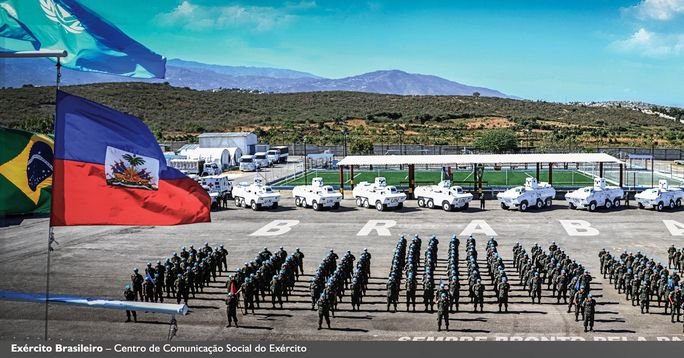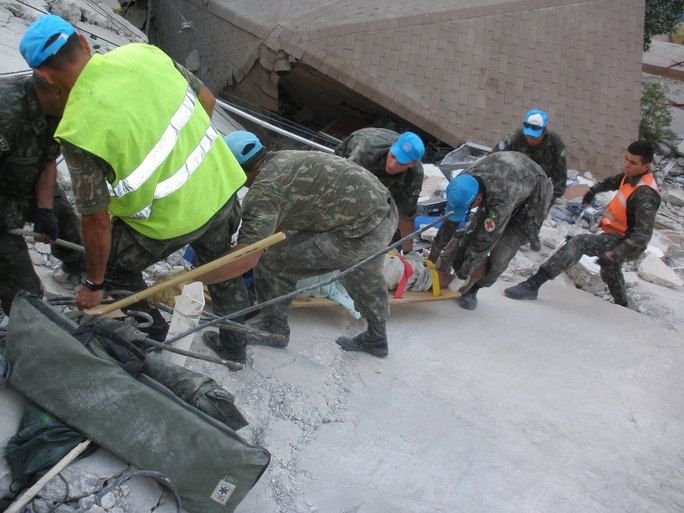International Relations
 Brazilian service members will remain in Haiti until October. (Photo: Army Public Affairs Office)
Brazilian service members will remain in Haiti until October. (Photo: Army Public Affairs Office)
The Brazil-led United Nations Stabilization Mission in Haiti (MINUSTAH) has been one of the longest running in the world. The mission began in 2004 when a situation of instability and lack of public safety arose in Haiti. It is the sole UN peacekeeping mission in the Americas.
 Brazil sent 37,000 troops to Haiti over the 13 years of MINUSTAH. (Photo: Army Public Affairs Office)
Brazil sent 37,000 troops to Haiti over the 13 years of MINUSTAH. (Photo: Army Public Affairs Office)The demobilization in Haiti has started. Beginning in May, the Peacekeeping Infantry Battalion of the 25th Brazilian Contingent (BRABAT 25) assumed responsibility for the Chilean, Uruguayan, and Peruvian areas. According to Colonel Roberth Alexandre Eickhoff, commander of BRABAT 25, Brazilian service members will ensure the security of the base facilities until the equipment is disassembled and sent to its respective nations.
Brigadier General Rogério Ramos Lage, deputy chief of Peacekeeping Operations for Brazil’s Ministry of Defense, said that base employment previously occupied by Chile, Uruguay, and Peru will require the deployment of up to two subunits outside of Port-au-Prince. “The battalion has the operational capacity to operate in these areas as well, but without including an increase in their responsibilities beyond what is already planned for the operational use of BRABAT.”
A portion of the Brazilian force is located in the township of Cap-Haitien, assuming security duties for the facilities there. But despite the expansion of their area of operations, the force will remain the same. According to Col. Eickhoff, the biggest challenge is operating at great distances, while ensuring logistical support and maintaining communications. “Setting up a base in the region to provide support to the troops will be necessary,” he said.
Col. Eickhoff added that the troops have been executing their demobilization planning while preparing the area for the next force, which will wind down the peacekeeping mission in the country. He considers Brazil’s 13-year participation in Haiti as having been fundamental to strengthening international relations and having provided an important service. “The feeling here is that we have fulfilled our duty. Additionally, MINUSTAH provided our Brazilian forces with expertise in peacekeeping missions, which will contribute to future peacekeeping missions around the world,” he said.
Demobilization of Brazilian troops
The Brazilian battalion’s operational activities in Haiti remain routine, even after the announcement of the end of MINUSTAH, set for October 15th. According to Brig. Gen. Lage, the objective is to maintain a secure and stable environment until their final departure. “The Office of Joint Operations, by way of the Office of the Deputy Chief of Peacekeeping Operations, is carrying out the Contingent Demobilization Plan and has been holding coordination meetings with those involved to work out the final details.”
 The 2010 earthquake was one of the most difficult moments faced by Brazilian service members in Haiti. (Photo: Army Public Affairs Office)
The 2010 earthquake was one of the most difficult moments faced by Brazilian service members in Haiti. (Photo: Army Public Affairs Office)“Today, we are working off the date of September 1st as the end of operations, with the departure of 90 percent of our force by September 15th,” said Brig. Gen. Lage, adding that after that date, the Brazilian force will turn to the administrative measures necessary for preparing the repatriation of the contingent’s personnel and equipment. “Everyone has to be out of the country by October 15th,” he confirmed.
Brazilian participation in Haiti
During the 13 years of MINUSTAH operations, Brazil sent 37,000 service members to Haiti, including 950 from the 26th and the last Brazilian contingent that is traveling there in May. Brig. Gen. Lage assessed the work done by the Brazilian Armed Forces in Haiti as excellent. “The Haitian people and the international authorities also recognize Brazil’s participation for their performance in combining military duties such as patrolling with social and humanitarian activities,” he stressed. According to him, many challenges had to be overcome since the first contingent arrived in 2004. “Operating in the pacification of Cité Soleil after the mission had just started was quite complicated. The 2010 earthquake and Hurricane Matthew in 2016 were also regarded as very difficult situations,” he recalled.
Between 2004 and December 2016, Brazil invested about $810 million in MINUSTAH, according to data from the Federal Integrated Financial Management System. The UN reimbursed Brazil about $296 million, according to the Ministry of Defense. Brig. Gen. Lage explained that the investment varied each year, depending on the complexity of the operation. “For example, in 2010 the year the earthquake occurred in Haiti, there was a substantial increase in spending as a result of opening up additional credits for humanitarian aid, and the facilities of the 2nd Contingent of the Peacekeeping Infantry Battalion Command [BRABAT 2],” he said.
He also recalled that the UN reimbursements have been for expenses incurred from using troops in the peacekeeping mission and that they did not collect money for expenses related to troop training in Brazil. Nonetheless, Brig. Gen. Lage stated that the relevant thing for Brazil is to take part in peacekeeping missions. “It’s important for projecting Brazil internationally, for troop training, and also for the foreign dissemination of domestic defense products that are used by Brazilian troops during these operations,” he said.
Upcoming missions
With MINUSTAH ending, Brazil remains in command of the peacekeeping mission of the United Nations Interim Force in Lebanon (UNIFIL), as well as having personnel in peacekeeping missions in the Central African Republic, Cyprus, Ivory Coast, Liberia, Sudan, South Sudan, and the Western Sahara. The Brazilian government has placed itself at the UN’s disposal for joining another peacekeeping mission. According to Brig. Gen. Lage, the Office of Joint Operations did a joint study called Project Seta to evaluate where Brazilian participation would be possible. “We identified various scenarios, which exist today, of peacekeeping missions in which we could operate,” he said.
Brazilian Minister of Defense Raul Jungmann stated that Brazil would be interested in participating in the peacekeeping mission in Lebanon, in addition to UNIFIL. He also considered the possibility of Brazilian participation in MONUSCO, the United Nations Organization Stabilization Mission in the Democratic Republic of the Congo. But according to Brig. Gen. Lage, the Brazilian government is waiting for an invitation from the UN to initiate the process of deploying troops to a new mission, through authorization from the Brazilian National Congress.